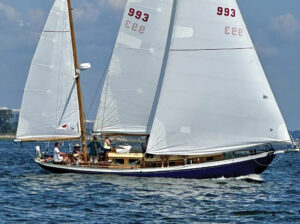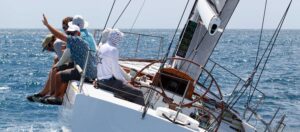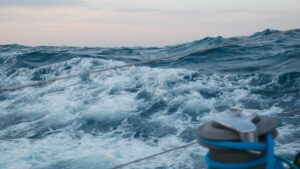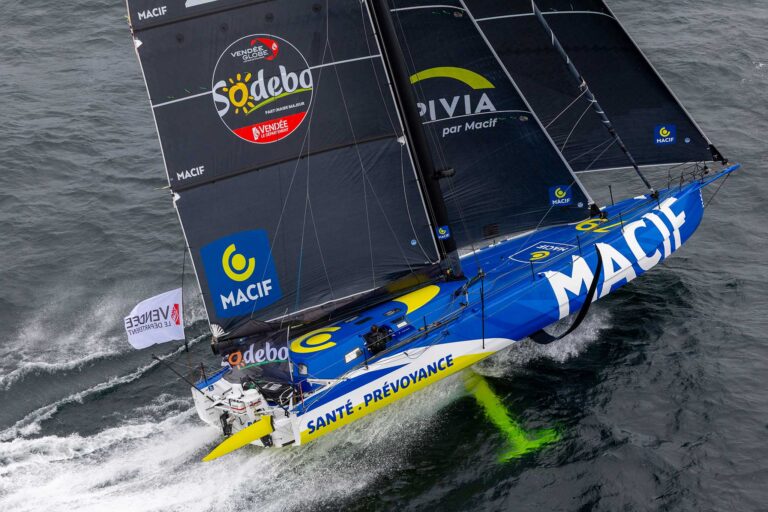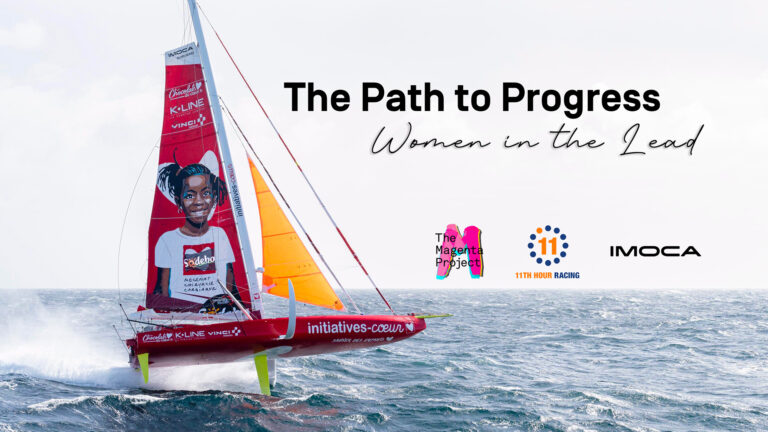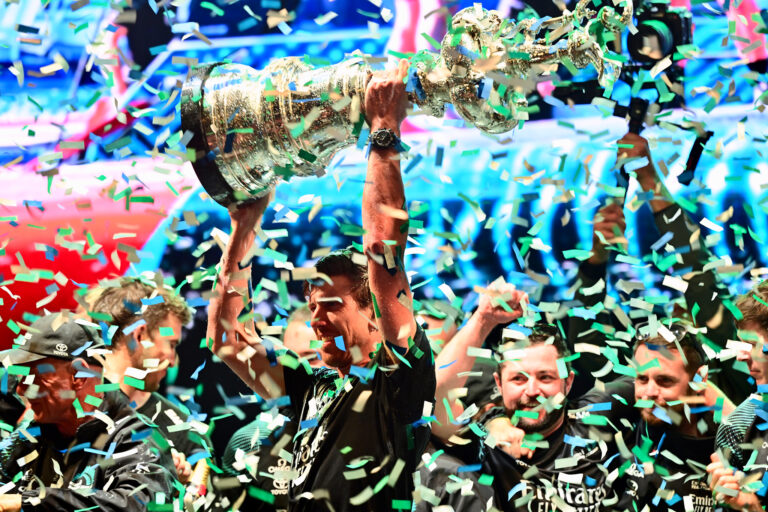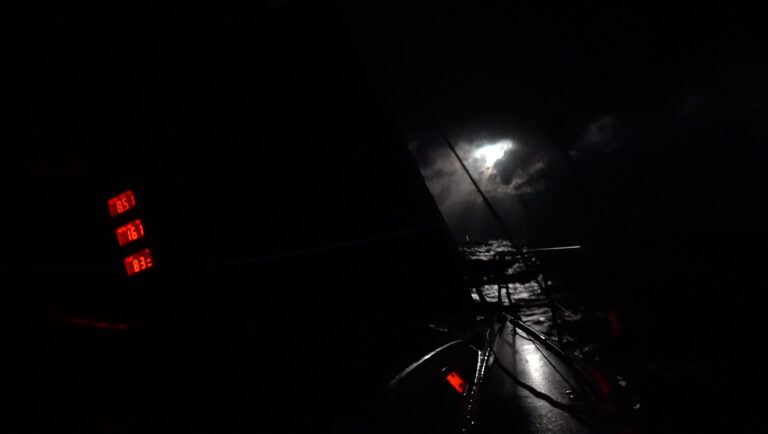For most sailors, winning the right to compete in the Olympic Games is a dream come true, but for Anna Tunnicliffe-Funk, 27, getting to the games was only the start: the real bull’s eye was winning a gold medal, a goal that she set for herself at the tender age of 12 just after immigrating to the U.S. with her parents from England. But in the 2008 Olympic Games in Qingdao, China, Tunnicliffe-Funk achieved this lofty goal in the Laser Radial class, bringing home the first U.S. women’s Olympic gold sailing medal in 20 years. This achievement won her the 2008 US Sailing Rolex Yachtswoman of the year award, which was followed up in 2009 when she won the coveted ISAF Rolex Yachtswoman of the year award, presented in Busan, Korea. While Tunnicliffe-Funk has proven herself to be a serious player in the Laser Radial class, she has been spending large swaths of time since Qingdao honing her match-racing skills, and announced at the Busan awards ceremony that she will be competing in the next Olympic trials in this new Olympic class. I caught up with Tunnicliffe-Funk to find out about her change in classes and to see what new goals this human dynamo has in mind.
First off, many congratulations for wining the ISAF/Rolex sailor of the year award. Did you see this coming or was it a surprise?
To be honest, I was totally surprised. I felt better about my chances this year, but then after seeing the video profiles of everyone, and knew that anyone of us could win
What do you feel was your biggest regatta of 2009? How so?
I’m notsure I had a biggest regatta per say, more that [I] did fairly well in two disciplines. My goal was to be successful in both the laser and the match racing, and I felt like that was accomplished.
I know that you also like to do triathlons–do you do these simply for fun, or do you feel that it also gives you an edge on the water?
Can you explain? I’ve only done one tri, but loved it. I also like to run a lot so I try and compete in road races.I definitely do it for fun, but I set goals for my running too. I think that sailing–especially the boats that I sail–are quite athletic, so being cardio fit is very important to me.
What was your motivation to switch from Radials to match racing?
It’s something new. I love Laser sailing, but I also really enjoy match racing.It is a totally different game. In match racing, everyone pretty much knows the plays, its just who can execute them better…who can plan ahead the best and pull off the needed move.I love sailing with my team, and the different boats that we sail are also a challenge too.
Do you find this format of racing to be more interesting, mentally, from singlehanded fleet racing?
The format is much faster paced. In Lasers, you will do two, maybe three races in a day and be done. You generally get into a pattern and then it’s a physical contest on who can get to the top the best, and then it comes down to technique skills downwind. Both are very challenging, but it’s a long endurance race.Match racing is a bunch of small sprints that take place through the day. Each race is a physical workout, but also a mental workout.You have to constantly think about what your competitor is going to do and come up with your counter move before it happens.
What was it like going head to head with Kenny Read and Paul Cayard at the BEYC Pro-Am? I heard you gave Kenny a run for his money…
It was very exciting for me. I remember the last race of the first day of the triple racing was a race with Kenny, Paul and me. I hadn’t done very well that day, and I knew that Kenny and Paul were tied on points. I told my team that this race was important for two reasons…firstly because it was the last race of the day, which meant it would be the race to the dock/bar, and secondly because we were racing against two amazing sailors. It was great to get to hangout with them. Kenny and I had a great match race finals, and I learned a lot from him and Paul during the week…I lookup to them, and the chance to sail with them was very exciting for me.
Is it difficult to maintain a successful marriage to another elite-level sailor? Does the travel schedules and the intense pressure on the RC’s make things harder? Also, do you and Brad [Funk] ever train together on the water?
Traveling does get hard, but we both do a lot of it, and usually we travel to the same events. Because we are both on the Olympic circuit, our schedules are basically the same, which allows us to see each other most of the year. There is usually a two-month stretch in the middle of the year when our worlds and Europeans come around that it gets a bit hard, but we make sure we talk a lot whilst we are gone.
Do you have aspirations to get into big-boat racing? AC? What about offshore racing?
I would love to do big-boat sailing, especially the AC one day. I know I have a lot to learn, but I’m keen on getting there. Any type of racing is fun for me, and I love to learn different skills and sail with different people to learn new things. As far as offshore racing, well, I’m not that crazy yet…ask me again in a few years.
What was the hardest regatta of your life? Qingdao? If not, can you give me a description of the race and also why it was so hard?
I think the Olympic Trials was the hardest regatta of my life. The sailing was tough, but the mental stress that went with that regatta was awful. I think it was the only regatta in my life that I have not fully enjoyed. It was so long, and the whole time, I was racing mostly only one boat. It was a very long match race regatta. Plus, I was racing one of the top Radial sailors in the world…any mistake and you would loose a race. It was very stressful.
I sawyou zooming around in Boston Harbor with Brad on Moths this spring when the VOR was in town. Any aspirations to get involved with that class?
I love sailing the moth, but I’m a bit of a scaredy cat when it comes to small boats and high speeds…I don’t like to get hurt. I plan to do a bit more Moth sailing this winter and get a bit more comfortable on the boat and then maybe enter into some races in the next couple of years.
What are your thoughts on how physical fitness affects your onboard performance? You’re pretty jacked, in a very graceful way…I’m guessing you take your training seriously?
I love to be in shape. It is always my goal to get better in shape. I feel very guilty if I miss a day running or at the gym. Like I said earlier, it is so important for our sport. We are athletes; so being in shape is a requirement in my mind.
If you weren’t a pro sailor, what would you be doing instead?
I would either be a pro in a different sport, or sitting in a cubicle doing peoples’ taxes and other accounting stuff.
I heard that you’re still planning on staying active in the Laser Radial class and that you’re hoping to race in both classes at the Olympic trials. How feasible is this? And should you qualify in both classes, how would this affect your preparations for the next Olympics?
My main goal of staying active in the laser is that it is a great cross training boat.I still have so much to learn about sailing, and especially Laser sailing, that I can’t just give up on it yet. I would like to compete in both trials, but we’ll see where we are with the Match racing.
At this point in your career, what are your biggest sailing goals? You’ve already achieved far more than most sailors will do in a lifetime…
My biggest goals are to win at least one more Gold Medal in the Olympics, to skipper an AC boat (and of course do well), and to become a top ranked match racer on the open circuit. They are high goals but with a lot of hard work,
I know it is possible.
As clich as this question is, who is your biggest sailing hero?
I have a couple. I think my biggest ones are Robert Schiedt, Nick Scandone, and Maureen McKinnon-Tucker
Favorite place to sail?
I love to sail anywhere warm, but I think so far in my career, my favorite place is Cabarete, Dominican Republic.
